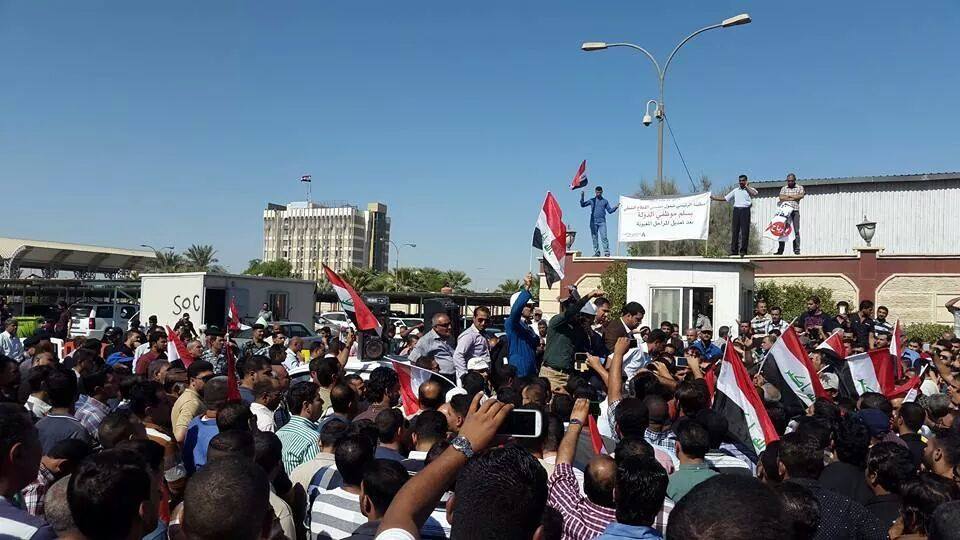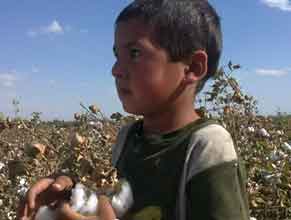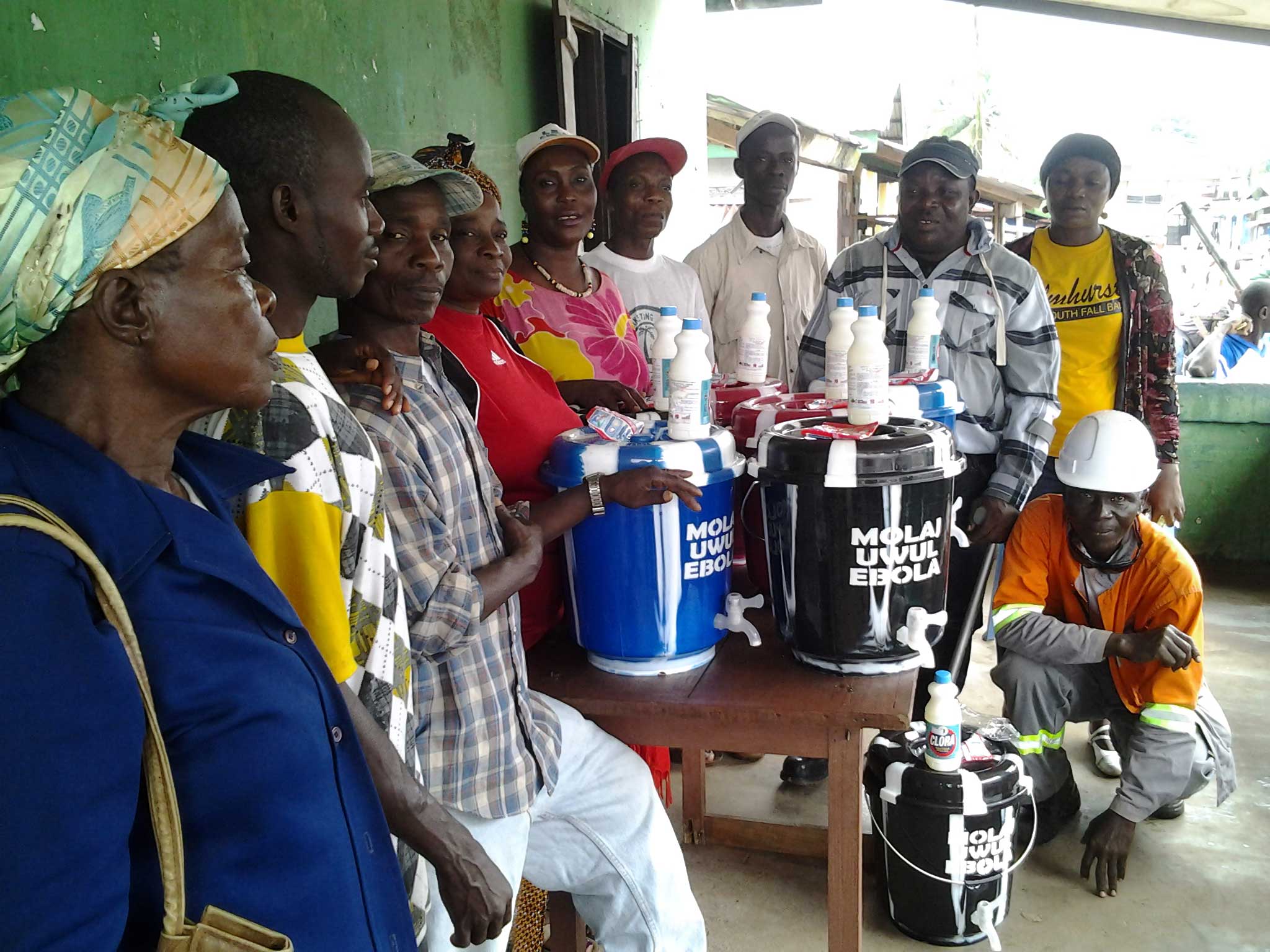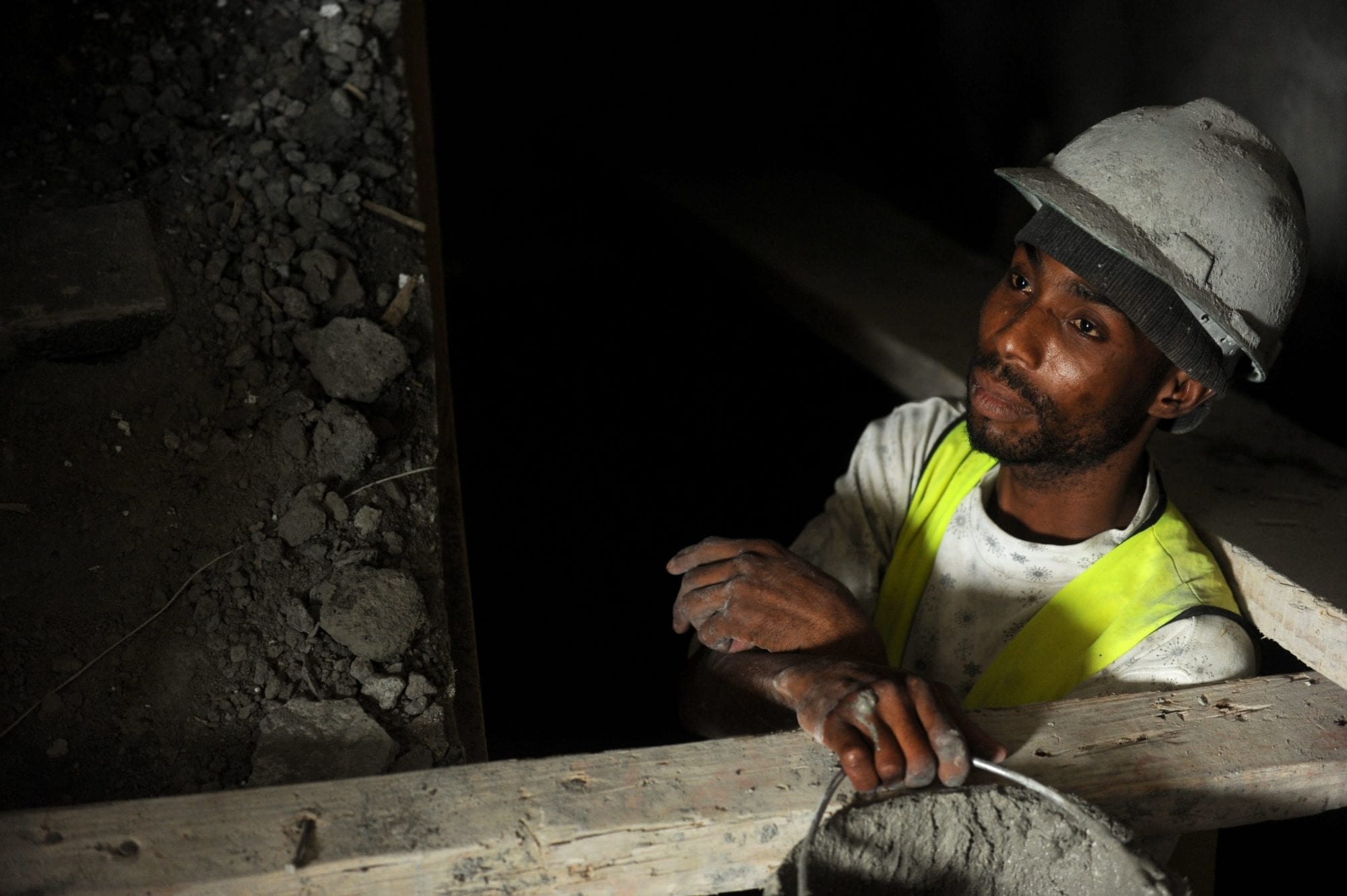
Nov 7, 2014
Some 2,000 workers recently took part in a rally in Basra organized by the Southern Oil Workers Committee, after the government refused to negotiate over issues such as jobs for unemployed workers, skills training and higher pay for hazardous work.
In August 2013, the government excluded workers in the state-run oil sector from receiving wage and benefit increases granted to other public employees. Public-sector wage increases ranged from 5 percent to 114 percent.
Workers delayed the action because of the country’s ongoing instability. Meanwhile, the committee’s negotiation team traveled to Baghdad to meet with government officials at the Ministry of Oil. After negotiations stalled, workers waged a mass rally.
“We are determined to achieve our rights and find no other way to be heard than peaceful demonstrations and sit-in actions,” the Southern Oil Committee said in a statement.
Read the full list of oil workers’ demands in English and Arabic.
Nov 5, 2014

A child picks cotton in Uzbekistan, part of the government’s forced labor system. Photo: Cotton Campaign
An estimated 5.5 million children labor in factories, brick kilns, farm fields and as domestic workers, exposed to dangerous and deadly working conditions and unable to attend school.
And 5.5 million is the number of signatures the nonprofit coalition End Child Slavery Week is seeking on a petition urging the United Nations (UN) to step up its focus on child slavery in the world body’s Sustainable Development Goals (SDG). The SDGs map the desired direction of member countries for the next 15 years.
The signatures will be hand-delivered to UN Secretary General Ban Ki-Moon as part of a broader campaign to revise the SDGs to incorporate a sharper global focus on addressing all forms of child labor, including enactment of appropriate laws to set and enforce a minimum age for employment, and measures to ensure that children go to school.
Help the campaign reach its goal: Sign the petition now.
“The number of child slaves has remained constant in the last two decades,” says Kailash Satyarthi, who won the Nobel Peace Prize this year for his work as a child rights’ activist. Child labor is a “largely neglected, ignored, denied aspect of human rights. Governments are saying they don’t have child labor” but “these children remain hidden behind the demonstrations of progress and modern images of government.”
In 1998, Satyarthi created the Global March Against Child Labor, a coalition of unions and child rights organizations from around the world, to work toward elimination of child labor. Global March members and partners are now in more than 140 countries. Many of these civil society groups, including the Solidarity Center, came together this year to launch End Child Slavery Week, focusing on improving the Sustainable Development Goals.
The mass mobilization campaign around the petition will ramp up November 20–26 with a week of public education focused on child labor and trafficking.
Part of the education process involves making the connection between jobs that do not pay living wages and the subsequent need for parents to take desperate actions to support their families, such as sending their children to work, says Satyarthi. If workers had the ability to freely form and join unions to improve their working conditions, they could improve their wages and support their families, he says.
“If parents can’t buy for themselves, how can they buy for their children?” he asks.
You can get the word out by signing and sharing the petition and through Facebook and Twitter @ECSWeek with the hashtag #endchildslaveryweek.
Oct 31, 2014

Workers from three union federations waged a general strike in Morocco. Credit: IndustriALL
Thousands of workers in Morocco’s three trade union federations waged a general strike Wednesday to protest the government’s refusal to discuss fundamental worker issues such as working conditions, pensions and other benefits.
manufacturing, commerce and agriculture, along with private-sector employees, took to the streets after many attempts to engage the government in collective bargaining.
The first-ever joint strike involving the Confédération Démocratique du Travail (CDT), the Union Marocain du Travail (UMT) and the Fédération Démocratique du Travail (FDT) highlighted worker frustration with the lack of dialogue. Workers also protested the government freezing salaries and benefits while raising taxes. The economic squeeze is exacerbated by the skyrocketing cost of consumer goods.
Workers also called out corporations for their selective application of Morocco’s labor code, saying many employers only abide by a few provisions and ignore key regulations such as those covering workplace health and safety and medical coverage.
The workers are demanding the government:
• Decrease taxes on wages and consumption,
• Retract the law that criminalizes union activity,
• Provide citizens with adequate public services,
• Guarantee secure and stable employment and cease hiring workers for precarious subcontracted or temporary jobs,
• End ongoing freedom of association violations, which include dismissing union leaders and firing large numbers of workers, and
• Address the concerns of retired workers struggling to survive on pensions.
Read the full list of demands in French and Arabic.

Oct 23, 2014
Union members across Liberia have taken the lead in Ebola education and prevention among workers and their families, holding awareness trainings for thousands of workers and supplying them with hand-washing buckets and sanitation cleansers donated in part through the Solidarity Center West Africa Ebola Fund.
At the Firestone Natural Rubber Plantation in Margibi County, where more than 11,000 full-time and precarious workers labor, and where 75,000 people live in 125 Firestone camps and in nearby communities, the Firestone Agricultural Workers Union (FAWUL) leaders and shop-stewards have so far reached 1,337 people in eight camps with protective equipment and information. FAWUL is a longtime Solidarity Center ally.
Working with the Movement for Labor Rights & Justice (MOLAJ), a nongovernmental organization, FAWUL has distributed 191 chlorine-filled hand-washing buckets. FAWUL members living in the area are closely monitoring use of the buckets, are teaching community members how to mix the water and chlorine, and encouraging them to replenish the chlorine when it runs out. The buckets are placed where people frequently gather, such as at community water pumps, and distributed to households with more than eight occupants.
Among workers at ArcelorMittal Liberia (AML), the United Workers’ Union of Liberia (UWUL) and UWUL Local 4, together with MOLAJ, reached 750 people through labor’s Ebola awareness and preventive measures campaign, providing 50 hand-washing buckets in communities in the Buchanan area, where a majority of AML workers live. UWUL, also a Solidarity Center ally, reached 21 disabled workers and 35 sight-impaired workers with awareness and prevention training, providing hand-washing buckets and $100 from the local union to replenish the chlorine.
Elsewhere, the Dockworkers Union (DOWUL) is reaching out to workers in Monrovia’s port; the General Agricultural and Allied Workers’ Union of Liberia (GAAWUL) has held education trainings for nearly 1,000 workers and their families living in camps at the Sime Darby Rubber and Oil Palm Plantations; and UWUL also is engaging workers at the Putu Iron Ore Mining company.
Liberia accounts for more than half of all the official Ebola deaths, nearly 2,500, and some reports indicate that figure is much higher. Women in Liberia—because of their roles as caregivers and their work in precarious informal economy jobs and as health care workers—are overwhelmingly affected: Up to 75 percent of people killed by Ebola have been women. Children orphaned by the disease often are left alone to survive in the street.

Oct 23, 2014
The Inter-American Court for Human Rights ordered the Dominican Republic to reform all national laws blocking the recognition of citizenship for children of undocumented parents born in the country.
The decision, dated August 28, 2014, was made public on October 22, 2014, according to a story today in El Dia, a national newspaper in the Dominican Republic. The sentence orders the country to adopt the necessary measures to ensure no laws or rules deny Dominican nationality to children born in the country to undocumented parents who migrated there.
The decision comes in a case in which 27 people were deported, five of them Haitian children residing in the Dominican Republic and 22 of whom were found to be Dominicans.
“The Court found the existence, at least for a period of around one decade after 1990, a systematic pattern of expulsions, including through collective acts of Haitians and people of Haitian descent, which reflects a discriminatory conception,” according to El Dia, quoting the court statement. The Inter-American Court for Human Rights is part of the Organization of American States.
In September 2013, the Dominican Republic’s Constitutional Court revoked the citizenship of individuals born in the country since 1929 who could not prove their parents’ regular migration status.
The ruling would have barred such individuals from any activity that required official identification, including working in the formal sector, attending school, opening a bank account, paying into retirement or social security funds, accessing health services, getting married, traveling or voting, according to an AFL-CIO and Solidarity Center report.
Further, it disproportionately affected individuals of Haitian descent living and working in the Dominican Republic.
Hailing the court decision, Geoff Herzog, Solidarity Center Dominican Republic country program director, said, “the Solidarity Center joins with our union allies and with our allies in the migrant support community in defense of migrant worker rights.
“We support recognition of citizenship for Dominicans of Haitian descent who are blocked from citizenship and therefore, are denied their basic human and labor rights.”





